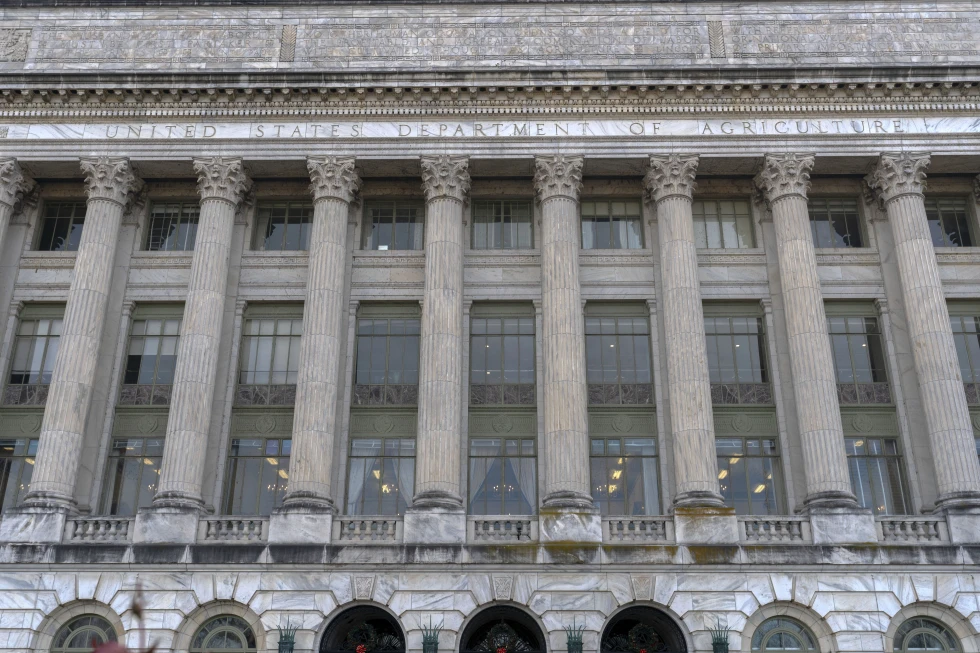Could NASA headquarters make a landing here in the Sunshine State?
Gov. Ron DeSantis made a voyage to Washington this week to pitch President Donald Trump on that and other topics. And as the new administration is clearly comfortable with slashing and burning the established order in Washington, DeSantis clearly senses an opening.
“Don’t build that new NASA building in D.C.,” DeSantis said while speaking here ahead of his trip.
The Governor instead wants a new headquarters in Cape Canaveral, pointing to ongoing renovations building up the base there already. And he’s putting it in language that Trump and Department of Government Efficiency head (or not?) Elon Musk can understand:
“Relocate the headquarters to Brevard County … you absolutely would save a lot of money. I think you’d probably save about a billion dollars, quite frankly, so we should do it. I think it’d be good for Florida if that happened,” DeSantis said.
If Trump is serious about reducing the bureaucracy in Washington, this move has plenty of potential. The cuts so far have been way too careless, and there is an argument to keeping certain operations in the central hub of our federal government.
But firing rockets? That’s what Cape Canaveral does best. And putting NASA’s top brass adjacent to the nation’s main launch hub makes a lot of sense.
DeSantis may have crashed and burned elsewhere this week (more on that later) but on this he’s dead right.
Now, it’s onto our weekly game of winners and losers.
Winners
Honorable mention: Lauren Melo. On Tuesday, Melo filed to run to succeed former Senate President Kathleen Passidomo in Senate District 28.
By Wednesday, Melo had Passidomo’s endorsement.
“She cares genuinely about the communities we represent, especially the most vulnerable. Her deep-rooted conservative values and hard work ethic make Lauren Melo the best candidate for Florida Senate District 28, and I am proud to endorse her campaign,” Passidomo said.
Melo is forgoing a final House term to run for the Senate, and when a well-regarded leader in Republican politics voices support for a preferred successor, it usually works out pretty well.
The race isn’t completely over yet, with former Republican Rep. Bob Rommel also running, and with significant financial resources.
But with Passidomo behind her, expect Melo to get plenty of institutional backing that will allow her to grow her war chest significantly in the year-plus before the August 2026 Primary.
Almost (but not quite) the biggest winner: James Uthmeier. Florida’s new Attorney General will now get to enter next cycle with incumbency and potentially serve in the role for around a decade.
We’ve known for weeks that Uthmeier would enter this role after DeSantis named his predecessor, Ashley Moody, to fill Marco Rubio’s Senate seat. But it wasn’t until Monday that Uthmeier was actually sworn in.
And in his very first week, Uthmeier got a seat at the table on the State Immigration Enforcement Council, appointing his preferred law enforcement representative to the panel. This is far from the last time we’re going to hear about the state’s immigration enforcement efforts, and Uthmeier will have a front-row seat.
“No empty rhetoric, no posturing, no excuses,” Uthmeier promised during his swearing-in ceremony.
Already, the Attorney General’s Office secured a 35-year prison sentence for a man accused of possession of child porn. Talk about moving fast.
And we also want to give Uthmeier some credit for a shrewd shot DeSantis took this week with an unveiling of a new George Washington statue in the Capitol Rotunda. The move was part of a planned series of events across Florida ahead of America’s 250th birthday. But it also allowed DeSantis to take a veiled shot at Trump, who recently tried framing himself as a king.
That led to these comments from DeSantis about Washington. “He could have been the king of the United States of America if he wanted to do it,” DeSantis said.
“He could have just ceremonially been elected as long as he wanted to, but he set the precedent of a two-term limit. And what he was trying to show was that he was not indispensable, that ultimately the Republic would go on and that you could elect different people to office. And that was a tradition that stood in this country until 1940 and then was eventually put in part of the Constitution.”
To the extent Uthmeier was involved in shaping those remarks, he deserves credit, especially considering how dirty Trump did DeSantis later in the week …
The biggest winner: Byron Donalds. Speaking of which, congratulations to the next Governor of Florida.
We are about three months from the last election and have nearly a full cycle to go until votes are cast in 2026. But the most important event in the Governor’s race may have already happened.
Just hours after reports emerged that DeSantis planned to pitch Trump in person against endorsing Donalds for Governor, Trump did just that ahead of DeSantis’ trip to Washington.
“Byron Donalds would be a truly Great and Powerful Governor for Florida and, should he decide to run, will have my Complete and Total Endorsement,” Trump posted in part. “RUN, BYRON, RUN!”
That led to a coy remark from Donalds. “President Trump is Making America Great Again. I’m committed to working with him to Keep Florida Great. Announcement coming soon!” Donalds wrote on X.
We’ll have more on the DeSantis angle shortly, but to say this gives Donalds an advantage in the 2026 GOP Primary is a massive understatement.
As beloved as DeSantis may be in Florida, Trump is the leader of the party and will still be well away from lame-duck status when the 2026 contest rolls around.
That makes Donalds a heavy favorite to secure the GOP nomination. And with Republicans dominating the state the past two cycles, we are highly skeptical at this point that Democrats can come out on top in 2026.
Donalds hasn’t made an official announcement yet, but expect him to make a move soon and start ramping up his operation, which already features some strong Trump allies.
Losers
Dishonorable mention: Florida agriculture. It’s been a rough period for the citrus industry, with declining yields over the past few years showing little sign of rebounding this harvest season.
The most recent report from the U.S. Department of Agriculture showed a drop in production projections this month, with analysts forecasting just 11.5 million boxes of oranges being produced.
For context, Florida produced 41.2 million boxes in the 2021-22 season. But those numbers have been falling due to a confluence of factors — including devastating storms and the ill effects of citrus greening — dropping to 15.8 million boxes in 2022-23 and just under 18 million last year.
Yet this year’s projection would represent a new low.
For grapefruit, tangerines and tangelos, the numbers aren’t much better. The grapefruit forecast sits at 1.1 million boxes, down from 3.33 million in 2021-22, 1.81 million in 2022-23 and 1.79 million in 2023-24.
For tangerines and tangelos, this year’s estimate of 350,000 boxes would also be a drop from 750,000 in 2021-22, 480,000 in 2022-23 and 450,000 in 2023-24.
Florida TaxWatch compiled a report weeks ago detailing the downfall of Florida’s citrus industry. And if state and national leaders don’t do something significant — and soon — it’s unclear how long “Florida” and “oranges” will be synonymous, a stunning change for those of us born and raised here.
Almost (but not quite) the biggest loser: Matt Gaetz. For Donalds’ gain, there were two major losers in the still-as-yet hypothetical 2026 Governor’s race.
The first is Gaetz, whose downfall we noted in recent months but who we thought, despite all of his struggles, could still make a comeback in 2026 should the man in the White House throw his support to Gaetz in the gubernatorial contest.
Well, so much for that.
And it really makes us question what the whole point of Gaetz’s U.S. Attorney bid was ever about if not to shield him from further scrutiny in Congress (a move which didn’t exactly come to pass anyway), seeing as he and Trump quickly pulled the plug on his bid.
Now, Gaetz is left with a show on One America News and a reputation that’s going to be hard to rehabilitate. It’s unclear if he has another chapter in public service or what it could even be.
The biggest loser: Ron and Casey DeSantis. Speaking of murky political futures, the DeSantises must be absolutely steaming right now.
Again, Trump is just straight up toying with DeSantis at this point given the timing of his Donalds endorsement.
And while the Governor has in the past downplayed Casey DeSantis’ desire to run for Governor, make no mistake: They wanted this to happen in 2026.
Do they still go through with it and set up another showdown with Trump? Maybe! Polling for Casey DeSantis has been strong, even among Trump supporters.
But there are 18 months until the Primary and outside of freaks like us, people are not paying attention to this race yet. When voters are hit over the head repeatedly that Trump has made a pick in this race, that polling is going to change.
Does that mean it’s impossible for Team DeSantis to get a win over Trump in 2026? Nope. But considering how their last electoral showdown went, we aren’t betting on it.
Ron DeSantis still has a lot of levers to pull in his final years as Governor. He’s not quite a lame-duck. But as the last few weeks showed, the Legislature is no longer a compliant arm of the executive branch, so the Governor’s hand is not going to get stronger in the years ahead.
Gaetz has been a master of grabbing attention but has always been a bit of a fringe figure. So him having a questionable future in politics isn’t a surprise.
That DeSantis, the nation’s most popular Governor among Republicans by far just a few years ago, does not have a clear next step in politics is baffling. If he and Casey DeSantis do go head-to-head with Trump again in 2026 and fail, expect his star to fall even further.
But we do know one thing: It will be an insanely entertaining Primary.
Post Views: 0

 Entertainment8 years ago
Entertainment8 years ago
 Entertainment8 years ago
Entertainment8 years ago
 Politics8 years ago
Politics8 years ago
 Tech8 years ago
Tech8 years ago
 Tech8 years ago
Tech8 years ago
 Tech8 years ago
Tech8 years ago
 Politics8 years ago
Politics8 years ago
 Tech8 years ago
Tech8 years ago









